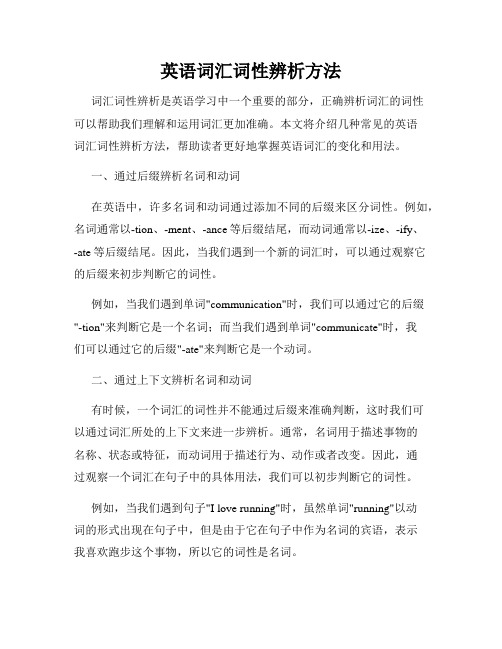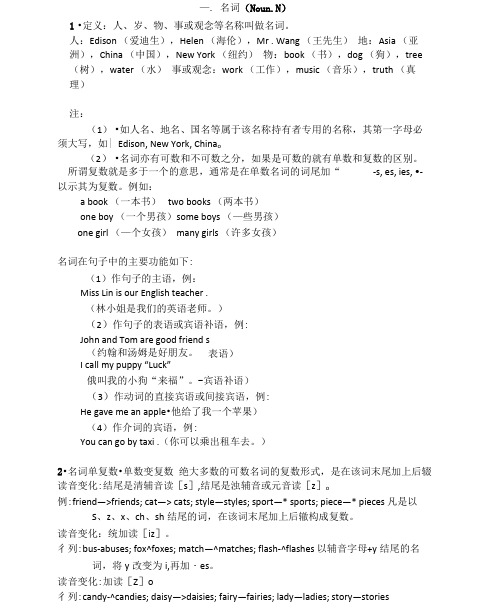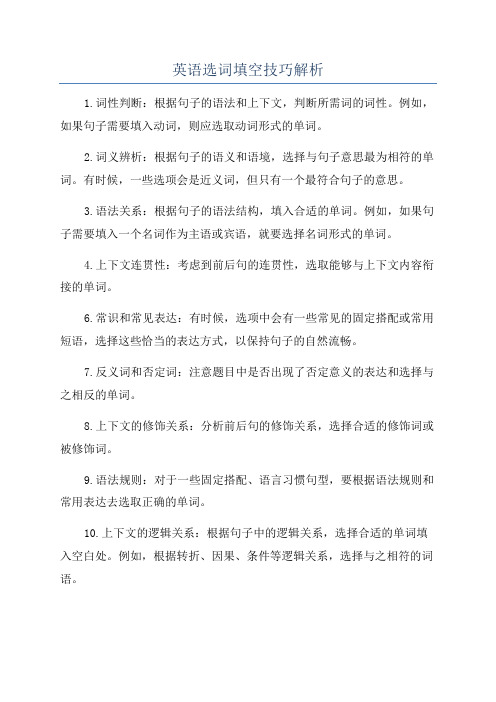英语单词词性和判断技巧
英语单词词性和判断技巧

英语单词词性词性尾缀其实很多,大家主要记住最常用的1. 名词后缀1)-or/er/ess/crat/cis:做某件事情或职业的人或物:worker, debtor2)-acy, 表示"性质,状态,境遇" democracy, accuracy, diplomacy3)-ance, -ence表示"性质,状况,行为,过程,总量,程度”importance, diligence, difference, obedience4)-ancy, -ency, 表示"性质,状态,行为,过程" frequency, urgency, efficiency,5)-bility, 表示"动作,性质,状态" possibility, flexibility, feasibility,6)-dom, 表示"等级,领域,状态" freedom, kingdom, wisdom7)-hood, 表示"资格,身份, 年纪,状态" childhood, manhood, falsehood8)-ion, -sion, -tion, -ation, -ition, 表示"行为的过程,结果,状况" action, solution, conclusion, destruction, expression, correction9)-ism, 表示"制度,主义,学说,信仰,行为" socialism, criticism, colloquialism, heroism10)-ity, 表示"性质,状态,程度”purity, reality, ability, calamity11)-ment, 表示"行为,状态,过程,手段及其结果treatment, movement, judgment, punishment, argument12)-ness, 表示"性质,状态,程度" goodness, kindness, tiredness, friendliness13)-ship, 表示"情况,性质,技巧,技能及身份,职业”hardship, membership, friendship14)-th, 表示"动作,性质,过程,状态" depth, wealth, truth, length, growth15)-tude, 表示"性质,状态,程度" latitude, altitude(海拔)16)-ure, 表示"行为,结果" exposure, pressure, failure, procedure(手续),17-grapy, 表示"……学,写法”biography, calligraphy, geography18)-ic, ics, 表示"……学……法" logic, mechanics, electronics, linguistics19)-ology, 表示"……学……论”biology, zoology, technology(工艺学)20)-nomy, 表示"……学……术" astronomy, economy, bionomy(生态学)2. 形容词后缀(1)带有“属性,倾向,相关”的含义1)-able, -ible, visible, flexible2)名词-ish, foolish, bookish, selfish(注意accomplish, vanish)3)-ive, active, sensitive, productive4)-like, manlike, childlike5)名词-ly, manly, fatherly, scholarly, motherly6)-some, troublesome, handsome7)-ful, beautiful, wonderful, helpful, truthful8)-ous, dangerous, generous, courageous, various9)-ent, violent10)-most, foremost, topmost11)less, 表示否定,countless, stainless, wireless3. 动词后缀1)-ize, ise, 表示"做成,变成,……化“modernize, mechanize, democratize, organize2)-en, 表示"使成为,引起,使有”quicken, weaken, soften, harden3)-fy, 表示"使……化, 使成”beautify, purify, intensify, signify, simplify4)-ish, 表示"使,令”finish, abolish, diminish, establish5)-ate, 表示“成为……,处理,作用”separate, operate, indicate4. 副词后缀(形容词)-ly:bad→badly坏地/恶劣地,careful→carefully小心地-wise(OE):clock→clockwise(a./adv.)顺时针方向的(地);like→likewise同样地-wards:out→outwards向外面地,north→northwards向北方地单词词性判断可以在词义的理解及书写句子方面帮助学生。
英语词汇词性辨析方法

英语词汇词性辨析方法词汇词性辨析是英语学习中一个重要的部分,正确辨析词汇的词性可以帮助我们理解和运用词汇更加准确。
本文将介绍几种常见的英语词汇词性辨析方法,帮助读者更好地掌握英语词汇的变化和用法。
一、通过后缀辨析名词和动词在英语中,许多名词和动词通过添加不同的后缀来区分词性。
例如,名词通常以-tion、-ment、-ance等后缀结尾,而动词通常以-ize、-ify、-ate等后缀结尾。
因此,当我们遇到一个新的词汇时,可以通过观察它的后缀来初步判断它的词性。
例如,当我们遇到单词"communication"时,我们可以通过它的后缀"-tion"来判断它是一个名词;而当我们遇到单词"communicate"时,我们可以通过它的后缀"-ate"来判断它是一个动词。
二、通过上下文辨析名词和动词有时候,一个词汇的词性并不能通过后缀来准确判断,这时我们可以通过词汇所处的上下文来进一步辨析。
通常,名词用于描述事物的名称、状态或特征,而动词用于描述行为、动作或者改变。
因此,通过观察一个词汇在句子中的具体用法,我们可以初步判断它的词性。
例如,当我们遇到句子"I love running"时,虽然单词"running"以动词的形式出现在句子中,但是由于它在句子中作为名词的宾语,表示我喜欢跑步这个事物,所以它的词性是名词。
三、通过词义辨析形容词和副词形容词用于修饰名词,描述事物的特征或状态,而副词用于修饰动词、形容词或其他副词,描述行为的方式、程度或频率。
因此,通过观察一个词汇在句子中所起的修饰作用,我们可以初步判断它的词性。
例如,当我们遇到句子"She sings beautifully"时,单词"beautifully"用于修饰动词"sings",描述她的歌唱方式,所以它的词性是副词。
英语词性词汇用法辨析技巧

英语词性词汇用法辨析技巧词性在英语中扮演着至关重要的角色,它可以决定一个单词的用法并在句子中发挥不同的功能。
为了更好地理解和运用英语词汇,我们需要掌握一些辨析词性的技巧。
本文将为大家介绍一些常见的英语词性辨析问题,并提供一些实用的技巧。
1. 名词(Noun)和动词(Verb)的区分名词和动词是英语中最基本的两种词性。
在辨析名词和动词时,可通过以下几个方面来判断:1.1. 句子结构:名词通常以作主语、宾语、表语等角色出现;而动词则表示动作或状态的发生。
例1:The cat runs.(名词作主语)例2:He likes playing tennis.(动词表示动作)1.2. 词义:名词描述事物的名称或实体,而动词则表示行为、状态或事件。
例1:Education is important.(名词描述事物名称)例2:I am learning English.(动词描述动作或状态)1.3. 词形转换:名词和动词之间可以通过词形转换来辨析。
例1:Have you read this book?(名词)例2:I like to read.(动词)2. 形容词(Adjective)和副词(Adverb)的区分形容词和副词也是常见的词性,在辨析时可以考虑以下几个方面:2.1. 修饰对象:形容词通常修饰名词,而副词则修饰动词、形容词或其他副词。
例1:She is a beautiful girl.(形容词修饰名词)例2:He runs quickly.(副词修饰动词)2.2. 词义:形容词描述名词的特征或性质,而副词则描述动作的方式、程度等。
例1:He is a careful driver.(形容词描述特征)例2:She speaks slowly.(副词描述方式)2.3. 词形转换:形容词和副词之间可以通过词形转换来辨析。
例1:She is a quick learner.(形容词)例2:She learns quickly.(副词)3. 介词(Preposition)和连词(Conjunction)的区分介词和连词在句子中具有不同的功能,可以通过以下几个方面来判断:3.1. 连接成分:连词通常用于连接两个句子、短语或单词,起到连接的作用;而介词则与名词或代词搭配使用,表示关系。
英语单词词性

英语单词词性英语里的词汇分为10种词性,分别是:n.名词v.动词pron.代词adj.形容词adv.副词num.数词art.冠词prep.介词conj.连词int.感叹词。
可分为两大类:实词:表示实在意义的词,有名词、动词、形容词、数词、量词、代词、副词.虚词:不表示实在意义而表示语法意义的词,有:介词、连词、助词、叹词.词性一、单词词性(一)、名词(nouns)n.名词是词性的一种,也是实词的一种,是指代人、物、事、时、地、情感、概念等实体或抽象事物的词。
名词可以分为专有名词(Proper Nouns和普通名词(Common Nouns)。
专有名词是某个(些)人,地方,机构等专有的名称,如Beijing,China等;普通名词是一类人或东西或是一个抽象概念的名词,如:book,sadness等。
1、可数名词的复数形式名词复数的规则变化:一般加s或es名词复数的不规则变化:1)child---children foot---feet tooth---teeth mouse---mice man---menwoman---women2)单复同形如:deer,sheep,fish,Chinese,Japanese3)集体名词,以单数形式出现,但实为复数。
如: people police cattle 等本身就是复数,不能说 a people,a police,a cattle,但可以说a person,a policeman,a head of cattle, the English,the British,the French,the Chinese,the Japanese,the Swiss 等名词,表示国民总称时,作复数用。
2、名词的格在英语中有些名词可以加"'s"来表示所有关系,带这种词尾的名词形式称为该名词的所有格,如:a teacher's book。
英语单词词性-怎样分辨英语单词词性

—. 名词(Noun.N)1•定义:人、岁、物、事或观念等名称叫做名词。
人:Edison (爱迪生),Helen (海伦),Mr . Wang (王先生)地:Asia (亚洲),China (中国),New York (纽约)物:book (书),dog (狗),tree (树),water (水)事或观念:work (工作),music (音乐),truth (真理)注:(1)•如人名、地名、国名等属于该名称持有者专用的名称,其第一字母必须大写,如| Edison, New York, China o(2)•名词亦有可数和不可数之分,如果是可数的就有单数和复数的区别。
所谓复数就是多于一个的意思,通常是在单数名词的词尾加“-s, es, ies, •-以示其为复数。
例如:a book (一本书)two books (两本书)one boy (一个男孩)some boys (—些男孩)one girl (—个女孩)many girls (许多女孩)名词在句子中的主要功能如下:(1)作句子的主语,例:Miss Lin is our English teacher .(林小姐是我们的英语老师。
)(2)作句子的表语或宾语补语,例:John and Tom are good friend s(约翰和汤姆是好朋友。
表语)I call my puppy “Luck”俄叫我的小狗“来福”。
-宾语补语)(3)作动词的直接宾语或间接宾语,例:He gave me an apple•他给了我一个苹果)(4)作介词的宾语,例:You can go by taxi .(你可以乘出租车去。
)2•名词单复数•单数变复数绝大多数的可数名词的复数形式,是在该词末尾加上后辍读音变化:结尾是清辅音读[s],结尾是浊辅音或元音读[z]o例:friend—>friends; cat—> cats; style—styles; sport—* sports; piece—* pieces 凡是以S、z、x、ch、sh结尾的词,在该词末尾加上后辙构成复数。
英语单词词性和判断技巧(2)

英语单词词性词性尾缀其实很多,大家主要记住最常用的1. 名词后缀1)-or/er/ess/crat/cis:做某件事情或职业的人或物:worker, debtor2)-acy, 表示"性质,状态,境遇" democr acy, accura cy, diplom acy3)-ance, -ence表示"性质,状况,行为,过程,总量,程度” import ance, dilige nce, differ ence, obedie nce4)-ancy, -ency, 表示"性质,状态,行为,过程" freque ncy, urgenc y, effici ency,5)-bility, 表示"动作,性质,状态" possib ility, flexib ility, feasib ility,6)-dom, 表示"等级,领域,状态" freedo m, kingdo m, wisdom7)-hood, 表示"资格,身份, 年纪,状态" childh ood, manhoo d, falseh ood8)-ion, -sion, -tion, -ation, -ition,表示"行为的过程,结果,状况" action, soluti on, conclu sion, destru ction, expres sion, correc tion9)-ism, 表示"制度,主义,学说,信仰,行为" social ism, critic ism, colloq uiali sm, herois m10)-ity, 表示"性质,状态,程度” purity, realit y, abilit y, calami ty11)-ment, 表示"行为,状态,过程,手段及其结果 treatm ent, moveme nt, judgme nt, punish ment, argume nt12)-ness, 表示"性质,状态,程度" goodne ss, kindne ss, tiredn ess, friend lines s13)-ship, 表示"情况,性质,技巧,技能及身份,职业” hardsh ip, member ship, friend ship14)-th, 表示"动作,性质,过程,状态" depth, wealth, truth, length, growth15)-tude, 表示"性质,状态,程度" latitu de, altitu de(海拔)16)-ure, 表示"行为,结果" exposu re, pressu re, failur e, proced ure(手续),17-grapy,表示"……学,写法” biogra phy, callig raphy, geogra phy18)-ic, ics, 表示"……学……法" logic, mechan ics, electr onics, lingui stics19)-ology,表示"……学……论”biolog y, zoolog y, techno logy(工艺学)20)-nomy, 表示"……学……术" astron omy, econom y, bionom y(生态学)2. 形容词后缀(1)带有“属性,倾向,相关”的含义1)-able, -ible, visibl e, flexib le2)名词-ish, foolis h, bookis h, selfis h(注意accomplis h, vanish)3)-ive, active, sensit ive, produc tive4)-like, manlik e, childl ike5)名词-ly, manly, father ly, schola rly, mother ly6)-some, troubl esome, handso me7)-ful, beauti ful, wonder ful, helpfu l, truthf ul8)-ous, danger ous, genero us, courag eous, variou s9)-ent, violen t10)-most, foremo st, topmos t11)less, 表示否定,countl ess, stainl ess, wirele ss3. 动词后缀1)-ize, ise, 表示"做成,变成,……化“modern ize, mechan ize, democr atize, organi ze2)-en, 表示"使成为,引起,使有” quicke n, weaken, soften, harden3)-fy, 表示"使……化, 使成”beauti fy, purify, intens ify, signif y, simpli fy4)-ish, 表示"使,令” finish, abolis h, dimini sh, establ ish5)-ate, 表示“成为……,处理,作用” separa te, operat e, indica te4. 副词后缀(形容词)-ly:bad→badly坏地/恶劣地,carefu l→carefu lly小心地-wise(OE):clock→clockw ise(a./adv.)顺时针方向的(地);like→likewi se同样地-wards:out→outwar ds向外面地,north→northw ards向北方地单词词性判断可以在词义的理解及书写句子方面帮助学生。
英语选词填空技巧解析

英语选词填空技巧解析
1.词性判断:根据句子的语法和上下文,判断所需词的词性。
例如,如果句子需要填入动词,则应选取动词形式的单词。
2.词义辨析:根据句子的语义和语境,选择与句子意思最为相符的单词。
有时候,一些选项会是近义词,但只有一个最符合句子的意思。
3.语法关系:根据句子的语法结构,填入合适的单词。
例如,如果句子需要填入一个名词作为主语或宾语,就要选择名词形式的单词。
4.上下文连贯性:考虑到前后句的连贯性,选取能够与上下文内容衔接的单词。
6.常识和常见表达:有时候,选项中会有一些常见的固定搭配或常用短语,选择这些恰当的表达方式,以保持句子的自然流畅。
7.反义词和否定词:注意题目中是否出现了否定意义的表达和选择与之相反的单词。
8.上下文的修饰关系:分析前后句的修饰关系,选择合适的修饰词或被修饰词。
9.语法规则:对于一些固定搭配、语言习惯句型,要根据语法规则和常用表达去选取正确的单词。
10.上下文的逻辑关系:根据句子中的逻辑关系,选择合适的单词填入空白处。
例如,根据转折、因果、条件等逻辑关系,选择与之相符的词语。
总之,解答英语选词填空题要根据句子的上下文、语法和逻辑关系进行综合分析和判断,选择与句子意思最为相符合的选项。
实践中还需要不断积累词汇和理解语境的能力,加强对英语单词的熟练运用。
英语四级选词填空高分技巧:如何确定词性汇总一篇

英语四级选词填空高分技巧:如何确定词性汇总一篇英语四级选词填空高分技巧:如何确定词性 1首先,名词的确定。
一般情况下,当文中出现a/an/the/adj./prep+( ). 的时候,空格处可以考虑填名词。
例如:2013年12月的真题,首先我们把15个词进行分类:名词:C、demand需求,要求;E、experience经验;G、graduates毕业生;H、operations运作,手术;L、ension紧张,张力;N、view观点,看法,景色动词:B、applied适用,应用;C、demand要求,需求;F、explores,探索,探究;I、promote促进,提升;J、qualifies使。
合格,取得资格;M、trained训练,培训;N、view考虑,看待O、worsens 恶化,变糟;形容词:A、additional附加的,额外的;D、excessive过多的,极度的;K、specialized专业的,专门的;Many students are recent( ); others are career switchers.分析:根据语境意思,此处要填名词,那么我们从名词中选择,只有G选项是符合要求的。
此题也比较简单,关键是考生要分清应填的词性。
其次,动词的确定。
动词的考察较多,主要有以下两种:1.主语后面选择填谓语动词,例如:But as the nursing shortage( ), a growing number of schools and hospitals are establishing “fast-track programs”。
解析:本句是as引导的原因状语从句,从句的主语是the nursing shortage,可以确定缺少谓语,此空应该填动词,而且是动词的单三形式,那么我们从动词栏中找只有F、J、O三个符合语法要求,然后根据上下文意思,空后意思是建立快速通道是针对护士短缺而采取的对策,此处应该是表达护士短缺现象变得“恶化”的意思,所以可以得出答案是O。
- 1、下载文档前请自行甄别文档内容的完整性,平台不提供额外的编辑、内容补充、找答案等附加服务。
- 2、"仅部分预览"的文档,不可在线预览部分如存在完整性等问题,可反馈申请退款(可完整预览的文档不适用该条件!)。
- 3、如文档侵犯您的权益,请联系客服反馈,我们会尽快为您处理(人工客服工作时间:9:00-18:30)。
英语单词词性词性尾缀其实很多,大家主要记住最常用的1. 名词后缀1)-or/er/ess/crat/cis:做某件事情或职业的人或物:worker, debtor2)-acy, 表示"性质,状态,境遇" democracy, accuracy, diplomacy3)-ance, -ence表示"性质,状况,行为,过程,总量,程度”importance, diligence, difference, obedience4)-ancy, -ency, 表示"性质,状态,行为,过程" frequency, urgency, efficiency,5)-bility, 表示"动作,性质,状态" possibility, flexibility, feasibility,6)-dom, 表示"等级,领域,状态" freedom, kingdom, wisdom7)-hood, 表示"资格,身份, 年纪,状态" childhood, manhood, falsehood8)-ion, -sion, -tion, -ation, -ition, 表示"行为的过程,结果,状况" action, solution, conclusion, destruction, expression, correction9)-ism, 表示"制度,主义,学说,信仰,行为" socialism, criticism, colloquialism, heroism10)-ity, 表示"性质,状态,程度”purity, reality, ability, calamity11)-ment, 表示"行为,状态,过程,手段及其结果treatment, movement, judgment, punishment, argument12)-ness, 表示"性质,状态,程度" goodness, kindness, tiredness, friendliness13)-ship, 表示"情况,性质,技巧,技能及身份,职业”hardship, membership, friendship14)-th, 表示"动作,性质,过程,状态" depth, wealth, truth, length, growth15)-tude, 表示"性质,状态,程度" latitude, altitude(海拔)16)-ure, 表示"行为,结果" exposure, pressure, failure, procedure(手续),17-grapy, 表示"……学,写法”biography, calligraphy, geography18)-ic, ics, 表示"……学……法" logic, mechanics, electronics, linguistics19)-ology, 表示"……学……论”biology, zoology, technology(工艺学)20)-nomy, 表示"……学……术" astronomy, economy, bionomy(生态学)2. 形容词后缀(1)带有“属性,倾向,相关”的含义1)-able, -ible, visible, flexible2)名词-ish, foolish, bookish, selfish(注意accomplish, vanish)3)-ive, active, sensitive, productive4)-like, manlike, childlike5)名词-ly, manly, fatherly, scholarly, motherly6)-some, troublesome, handsome7)-ful, beautiful, wonderful, helpful, truthful8)-ous, dangerous, generous, courageous, various9)-ent, violent10)-most, foremost, topmost11)less, 表示否定,countless, stainless, wireless3. 动词后缀1)-ize, ise, 表示"做成,变成,……化“modernize, mechanize, democratize, organize2)-en, 表示"使成为,引起,使有”quicken, weaken, soften, harden3)-fy, 表示"使……化, 使成”beautify, purify, intensify, signify, simplify4)-ish, 表示"使,令”finish, abolish, diminish, establish5)-ate, 表示“成为……,处理,作用”separate, operate, indicate4. 副词后缀(形容词)-ly:bad→badly坏地/恶劣地,careful→carefully小心地-wise(OE):clock→clockwise(a./adv.)顺时针方向的(地);like→likewise同样地-wards:out→outwards向外面地,north→northwards向北方地单词词性判断可以在词义的理解及书写句子方面帮助学生。
名词有四数:可数与不可数,单数或复数;限定与动词不可忘。
四数加限定!一.怎样确定名词:一般情况下在下列结构中我们可确定所缺空应为名词◇1.a/an/the +(adj.)+ 名词;a/the book; the rich the disabled the Smiths◇2.adj.+名词; a big stone; a long river; interesting books◇3.adv.+ adj.+名词; a very honest boy◇4.介词+名词;in the room; under construction◇5.形容词性物主代词+名词;my surprise; his honesty◇6. 数词+名词;five girls;◇7.缺的词在句中为主语,表语,宾语时多为名词。
They have books.及时练习1:1.There has been a 30% growth in the ____(市场) for personal computers.3.He has discovered a lot of ___________ (发现) in science .5.I am sorry that I can’t attend the __________(讲座) on American history .6.She started as a successful merchant but ended up as a __________(乞丐).7.There was a surprised _____________(表情)on her face .8.Our city has experienced great ___________(变化)in the past few years9.Please give my _________(祝贺)when you see her .10.Jack took a deep _____________ (呼吸)and then dived into the water.11.Oliver was unable to give police a ______________(描述)of his attack .12.The car was a ____________(廉价货)at the price.动词→名词练习:achieve add argue arriverespondretire rude save sail sell 1. market 3 discoveries 5.lecture 6 beggar 7. expression 8 changes 9. congratulations 10. breath 11. description 12. bargain及时练习2:指出下列文中的名词:In the early 1990s, the word “Internet” was strange to most people. But today, Internet has become a useful tool for people all over the world. Maybe Internet has been the greatest invention in the field of communication in the history of mankind(人类).Communicating with others on the Internet is much faster. We can chat with a person who is sitting in the other part of the world. We can e-mail our friends and they can read the e-mails within a minute.Giving all kinds of information is probably the biggest advantage of the Internet. We can use search engines to find the information we need. Just type in a keyword or keywords and the search engine will give us a list of suitable websites to look at.We can enjoy a lot on the Internet by downloading games, visiting chat rooms or surfing (浏览)websites. There are some games for free. We can meet new and interesting people in the chat now. We can also listen to music and see films.二.怎样确定名词的单数或复数;可数或不可数§确定名词单数或复数的方法:1.由名词前面的数词: 1. I have several ______ (书) on the shelf. 2. This bus can carry 60 (乘客).2.由名词后的动词单数或复数(即主谓一致): The _____ (建议) are reasonable and some of us will accept them.3.由句意: Our ______ (教授) held a meeting about how to improve our English.What is the best-known chain of fast-food (餐馆)in the world.※及时练习3:判断下列名词正误:1. They often have fish, meat and vegetable for supper.2. Mrs. Smith gets well along with her neighbor.3. They had only three meal of soup every day.4. Dickens wrote Oliver Twist in the year 1837 - 1838.5. His new play was a great succeed.6. The animals are useful to the desert people in many way.7. As he explored the sea,he took picture and videos of many thing that people had never seen before.8. They were given kinds of breakfast,and sometimes they got no breakfast at all.9. School child walked with their shirts,coats and anything else they could find pulled up over their nose.10. The middle part of the 20th century brought new ways to help people get over disease.11. Too many trees have been cut this years.12. They use camels for carrying water,food,tents and another things.注意三类名词:1、总是不可数的名词:1) 物质名词:furniture, equipment,2) 抽象名词:advice, progress, news, fun, truth, milk, ink, rice, …2. 根据名词本身的意义:1) 物质名词:water(水水域, rain (雨水2) 抽象名词:experience(经验愉快成功遗憾surprise(惊讶3. 个体名词总是可数名词:book, desk,三.限定词:限定词是位于名词或名词词组之前,对他们在特指、泛指或数量等方面起限定作用的一类词。
